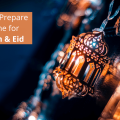7/28/2021
What Is Eid ul-Fitr?

8/2/2021
There are two different celebrations during the Islamic calendar year, Eid ul-Fitr and Eid ul-Adha. Both of these celebrations are very important to Muslims around the world, but they are celebrated for different reasons. Eid ul-Fitr literally means "the festival of breaking the fast" and occurs at the end of every Ramadan to mark the end of our fasting. This is a joyous occasion for Muslims because it is a chance to celebrate the end of the month of fasting and worship with friends, family, and the entire community.
For the celebration, communities come together for the special Eid prayer, share meals together and participate in Zakat al-Fitr. Zakat al-Fitr (almsgiving of breaking the fast) is the obligatory charity due upon every single Muslim (regardless of age, gender or income) at the end of the month of Ramadan, and must be paid before maghrib of the last day of Ramadan, or before going to the Eid prayer on Eid day at the latest. Traditionally, Zakat ul-Fitr is one sa' (i.e. a volume measure equivalent to four double-handfuls) of a staple food of any given area (for instance, a sa' of rice, dates, wheat, barley, etc.). Most contemporary scholars have agreed that the payment of Zakat ul-Fitr can be the equivalent value in money for any specific local area. Check with your local mosque and follow their guidelines regarding when to pay and what to give insha'Allah.
Other articles and publications:
Ramadan is a sacred, holy month for Muslims. It's a time of reflection, prayer, and giving.
Decorating our homes for Ramadan and Eid is a great way to fully immerse ourselves in this blessed time of year and focus on our spiritual journey.
7/28/2021
There is so much to be said about the miraculous event of Al-Israa' Wal-Mi'raaj. In this article, we focus on its linguistic meaning, what each word refers to of this exceptional journey,
7/30/2021
Decorating our homes for Ramadan and Eid is a great way to fully immerse ourselves in this blessed time of year and focus on our spiritual journey.
8/4/2021
Online Quran tutors make every possible effort to turn the boring lectures into interactive, fun, and interesting sessions.
2/5/2021
A beautiful or melodious voice isn’t what required to recite and memorize the holy books such as the Quran,
2/5/2021
Business details
- +1 (855) 226-2848
- P. O. Box 3125, Conroe, TX 77304
- studioarabiya.com
With a team of more than 200 qualified staff members and teachers, Studio Arabiya is one of the noted Online Arabic & Quran institutes. We provide high-quality education.





